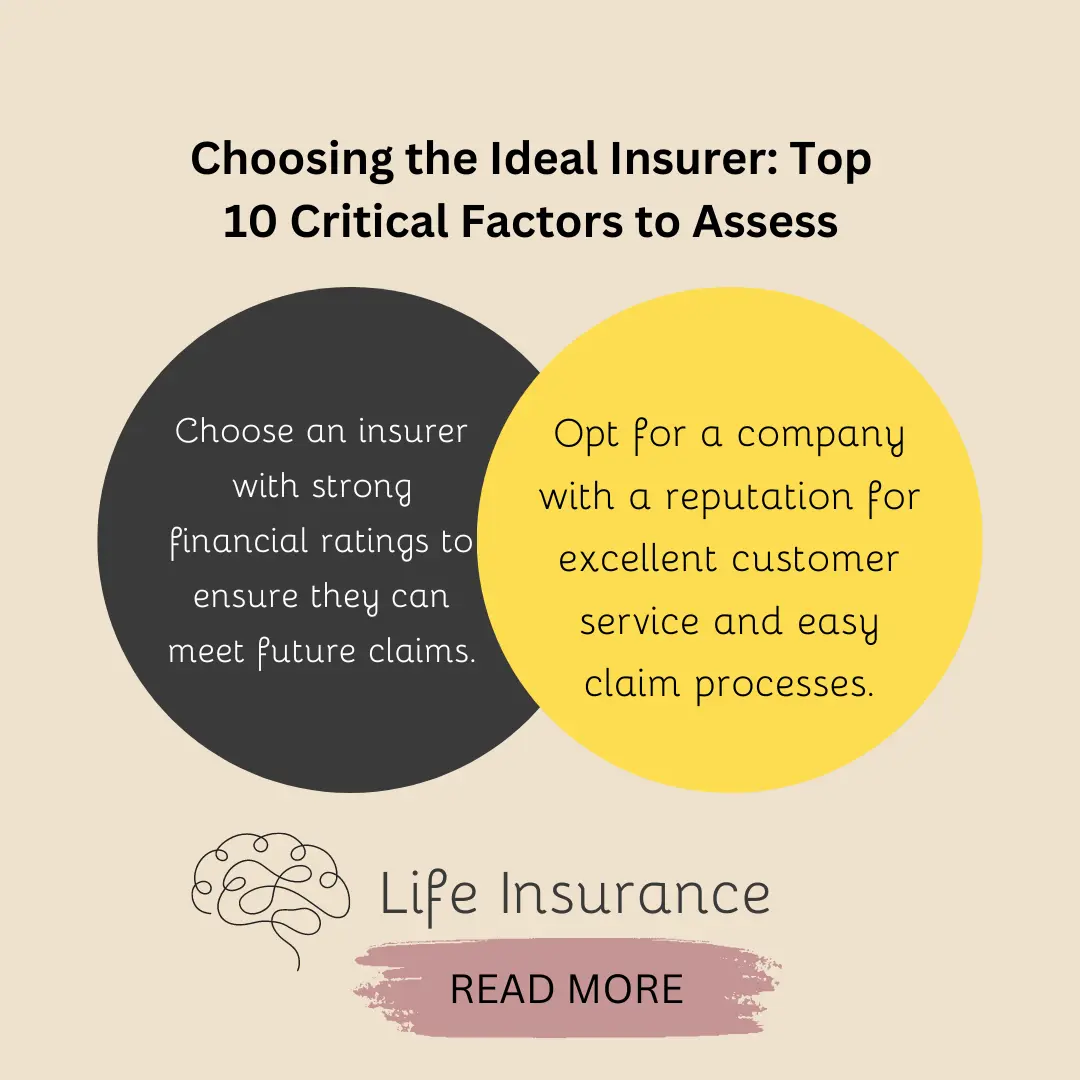Financial planning needs insurance to offer security in hard times. With so many options, choosing an insurer may be challenging. Our comprehensive guide on the top 10 insurance selection criteria will help you decide.
1. Long-term financial security
Financial stability underlies insurance reliability. It ensures insurers honour policyholder promises during economic downturns. Understanding an insurer’s finances is recommended and necessary for long-term security.
Financial Strength Ratings
Independent agencies rate insurers’ financial health. S&P, Moody’s, A.M. Best assess insurance companies’ finances. Their assessments objectively evaluate the insurer’s financial soundness.
Detailed Analysis: Reserves and Performance
Ratings are useful, but judging an insurer’s financial soundness takes more. The insurer’s prior performance may reveal financial management habits. Additionally, checking reserve levels indicates preparedness for unexpected circumstances.
Managing Economic Volatility
In today’s volatile economy, stability matters. Insurers need resilience and adaptability to survive recessions. Policyholders seeking peace of mind should assess an insurer’s storm-resistance.
Analysis of Financial Reports
An insurer’s financial health may be best assessed via financial reports. These reports detail the insurer’s assets, liabilities, and finances. Such reports show the insurer’s financial health and ability to pay claims now and in the future.
2. Reputation and Track Record demonstrate dependability
Trustworthiness and dependability are shown by insurance reputation. It depicts policyholders’ experiences and the insurer’s servicing effort. To choose an insurer prudently, check their reputation and track record.
Reputation shows dependability
Insurance companies are known for their honesty and client service. Current and former policyholders and industry professionals remark. Web evaluations, industry awards, and accolades can assess the insurer’s reputation.
History: Track Record
Reputation depends on an insurer’s track record. Their ethics claim settlements and customer satisfaction are evaluated. Timely claim settlement and exceptional customer service demonstrate an insurer’s quality.
For Validation: Awards, Accolades, Industry Recognition
Awards recognise insurers’ performance and service. These awards are given by industry groups, consumer advocacy groups, and independent reviewers. This honour signifies the insurance consistently exceeds expectations and receives positive stakeholder feedback.
Word-of-mouth recommendations
In addition to official awards, friends, family, and coworkers’ recommendations assist assess an insurer’s reputation. Personal experiences may show the insurer’s claims administration, service, and reliability. Advice from trusted friends can assist in choosing an insurer.
3. Protection Options: Customised
Insurance coverage choices change with individual and corporate needs. Compare an insurer’s coverage choices to be sure they fit your needs. Your ideal insurance offers life, health, property, and liability coverage.
Your Needs: Coverage Evaluation
Determine your insurance needs before comparing insurers. Consider lifestyle, finances, and risk to determine coverage requirements. An effective insurance strategy begins with obvious needs, such as life or company liability insurance.
Spectrum Exploration: Coverage Options
Good insurers understand different demands. They provide many coverage options to fit different needs. From basic coverage to complete protection, a wide choice of insurance options should be provided for different situations and risk profiles.
Customisation: Flexible Coverage
Flexibility is key in insurance. Find insurance with customisable coverage limits, deductibles, and other options to meet your budget and risk tolerance. Whether you pick higher deductibles to lower premiums or endorsements to boost coverage, customising your policy meets your changing demands.
Good Coverage: Complete Protection
Although cost is important, sufficient coverage is necessary to defend against unanticipated dangers and responsibilities. Make sure your insurer covers many important risks and possibilities. Property damage, medical expenditures, and legal fees are reduced with comprehensive coverage.
Goal-oriented coverage
Insurance should help your financial goals beyond lender and regulatory requirements. Choose an insurance that knows your goals and provides needed coverage and personalised solutions.
4. Efficiency: Streamlining Hard Times Aid
Consumers seek assistance with insurance claims during difficult times. These processes’ efficiency and effectiveness can dramatically impact an insurer’s experience. Consider claims processing while choosing an insurance to ensure a smooth and stress-free experience.
Should Know Claims Procedures
From claim filing to settlement, claims management has various steps. Assessing an insurer’s claims processing procedures involves claim filing ease, customer service responsiveness, and claim settlement efficiency. Claims procedures that are simple and fast comfort policyholders in stressful times.
Claim Filing Made Simple
Initial claim filing should be simple for policyholders. Assess the insurer’s claim submission procedure for accessibility, convenience, and channels. Online portals, smartphone apps, and dedicated helplines streamline claim submission, enhancing customer satisfaction.
Rating Efficiency with Reviews and Testimonials
Online policyholder reviews can evaluate an insurer’s claims management. Firsthand stories from insurance claims process participants provide insights. Communication, transparency, and claim settlement satisfaction should be reviewed.
5. Support boosts customer satisfaction
Excellent customer service is key to insurance client happiness. To answer inquiries, resolve difficulties, and develop trust, an insurer’s customer support personnel must be accessible, timely, and knowledgeable. Customer service should be considered while choosing an insurer to guarantee a positive experience.
Important Accessibility and Responsiveness Metrics
Accessibility and responsiveness are key to client service. Insurer phone, email, and chat service evaluation. Take into account their reaction time and thoroughness. An accessible and responsive customer service team values policyholders.
Feedback from Customers: Experience-Based
Feedback shows an insurer’s customer service. Read online policyholder reviews, testimonies, and ratings to evaluate the insurer. See feedback trends for customer support team accessibility, responsiveness, and knowledge.

6. Cost-coverage ratio
Though price and affordability impact insurance purchases, good coverage is more crucial. Affordable options are good, but the budget must be balanced with coverage. Choosing an insurer: Pricing and affordability
Understanding Affordability Beyond the Bottom Line
Consider insurance premium affordability beyond the bottom line. To assess the insurer’s value, compare coverage limits, deductibles, and policy features to the premium. Comprehensive insurance costs more but may provide better financial protection over time.
Multiple Quote Comparison
Find competitive premiums by comparing similar coverage from many insurers. This comparison allows you to compare prices and save money. Make sure coverage limits and deductibles match to compare insurance costs.
Discounts and incentives enhance savings
Ask about reductions or incentives to lower costs without compromising coverage. Driving cleanly, bundling insurance, and putting safety devices in your home or automobile may save you money. These cuts can drastically decrease your insurance rates without compromising coverage.
7. Fair premiums start with underwriting
Insurance risk assessment and premium pricing depend on underwriting. Policyholders must grasp underwriting guidelines to ensure insurance fairness, accuracy, and transparency. The following stages indicate an insurer’s underwriting and risk assessment criteria:
Underwriting Guidelines: Decision-Making Basis
Underwriting guidelines help insurers evaluate risks and determine coverage. Age, health, occupation, and lifestyle impact insurer risk assessment and rates. Underwriting standards reflect an insurer’s risk assessment approach and commitment to fairness and accuracy.
Fair Underwriting Disclosure
Underwriting must make premium pricing fair and transparent. Underwriting guidelines should be clearly communicated to policyholders. This transparency helps policyholders understand how risk variables impact prices, enhancing insurance trust.
8. Understand Coverage: Features and Exclusions
Details matter with insurance. Insurance policy terms and conditions must be reviewed to understand coverage, exclusions, and conditions that may influence protection. Attention to insurance features and exclusions helps policyholders avoid surprises and explain claims. Manage insurance features and exclusions:
Review of Coverage Limits and Exclusions
First, review the insurance policy’s exclusions and limits. Understand the policy’s risks, dangers, and duties. Exclusions and restrictions that may affect the policyholder’s claim submission must also be identified.
Clear Communication Prevents Claim Surprises
Policyholders must understand policy features and limits to make informed decisions and avoid claim surprises. Understand the policy’s terms by consulting the insurer or a certified representative. Clarify the policy’s coverage, exclusions, and conditions.
Restrictions: Vulnerability Identification
Insurance exclusions and limits determine coverage. Understand the policy’s exclusions for war, intentional behaviour, and pre-existing conditions. Know coverage limitations, waiting periods, and activation requirements.
Clarify with the insurer or agent
If insurance wording or exclusions are confusing, contact the insurer or a licenced agent. Request insurance coverage clarification. Insurance providers and agents explain programmes and answer questions.
9. Compliance and Licencing: Consumer Rights Protection
Licencing and regulation safeguard insurance consumers. For peace of mind and remedies in the event of disputes or non-compliance, be sure an insurer is licenced in your state or nation and follows rules.
Licence Verification: Legal Authorization
Before employing an insurer, check their licencing with your state or country’s authority. Make sure the insurer is licenced in your state. Insurance regulatory bodies and government websites provide verification.
Verifying Regulations: Compliance
Make sure the insurance is licenced and regulated to comply with legislation. Check for the regulator or consumer protection agency sanctions, disciplinary actions, or complaints against the insurance. Documents show the insurer’s compliance and consumer rights commitment.
Licence Importance: Legal Protections and Recourse
Policyholders can sue a licenced insurer for noncompliance. Financial soundness, customer protection, and ethics are required by licenced insurers. Policyholders can contest insurance claims and get fair treatment from regulators.
10. Innovation and Technology: Transforming Insurance Services
Insurance companies benefit from new technology in customer service, processes, and efficiency. Check an insurer’s digital capabilities for ease and efficiency. How to assess insurer innovation and technology:
A Modern Digital Capability Assessment Method

Check the insurer’s digital capabilities, including tech solutions to improve insurance. Wanted: mobile apps, policy management websites, and digital claims processing. These digital technologies make claims acquisition and settlement easy for policyholders.
Easy Online Policy Management
Online portals let policyholders manage policies anytime, anywhere. Check the portal’s insurance renewal, coverage changes, and premium payment options. Insurance policy administration is simpler and more versatile with an interface.
Mobile Apps: Mobile Access
Insurance services on the go need mobile apps. If available, use the insurer’s mobile app. Check policy access, claims submission, and emergency aid. A good mobile app allows policyholders to use their phones and tablets to get insurance anytime, anywhere.
Digital Processing Simplifies Claims Settlement
Digital claims processing reduces paperwork and speeds decision-making. Ask about the insurer’s efficient digital claims processing and administration. Online claims submission, real-time claim tracking, and electronic payment processing simplify and speed up claims, improving consumer satisfaction.
Conclusion
Financial stability, reputation, coverage alternatives, claims process efficiency, customer service quality, cost, underwriting standards, policy features, regulatory compliance, and technological innovation must be considered when choosing insurance. Analysing these difficulties can help you safeguard yourself, your family, or your business. Examine your insurance needs and insurer’s performance regularly to adapt to changing situations and maintain enough coverage.


2 thoughts on “Choosing the Ideal Insurer: Top 10 Critical Factors to Assess”